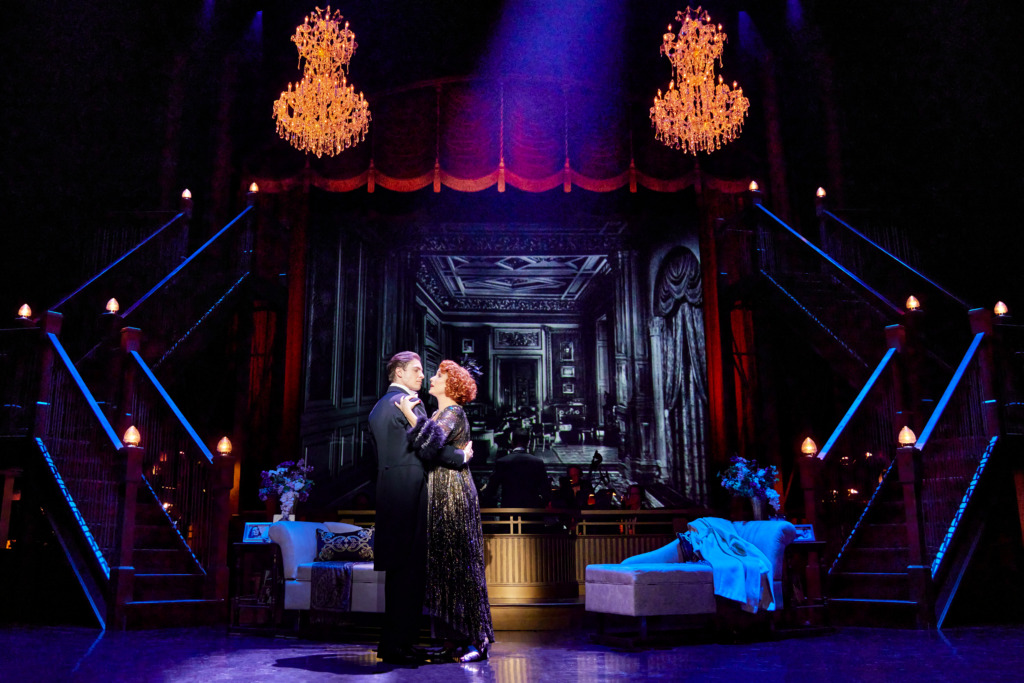Teaching the world new ways to dream. But what happens when the shimmering gold of dreams fades to a distant silver of memory. Age comes for us all in the end does it not? The tragically beautiful and strikingly dramatic score of Andrew Lloyd Webber’s Sunset Boulevard is sweeping the stage of the Eisenhower at The Kennedy Center this February as a part of the Broadway Center Stage series. With book & lyrics by Don Black & Christopher Hampton, the bittersweet recollection Norma Desmond and her life, as filtered through the lens of struggling screenwriter Joe Gillis comes to vivacious technicolor life on stage under the keen direction of Sammi Cannold. With choreography by Emily Maltby and music direction (and live orchestral conduction) by Ben Cohn, this gorgeous and harrowing tale has audiences enraptured, thundering their ovations with great frequency throughout the performance.
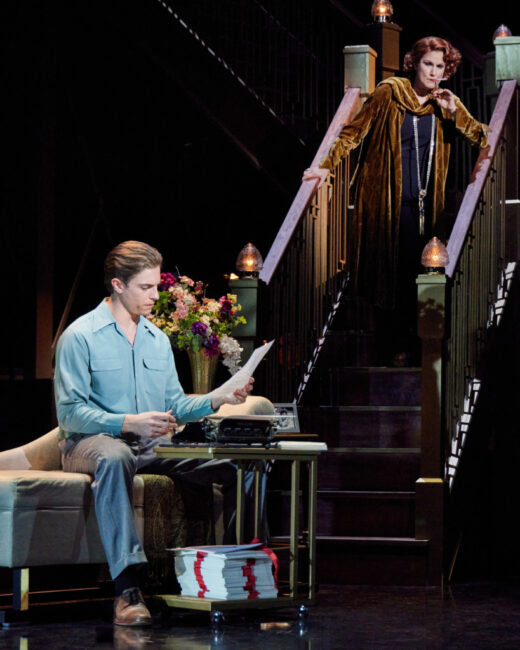
One of the breathtaking features about the Broadway Center Stage series at The Kennedy Center is its full integration of the live orchestra on stage; they become a living, breathing component-character to the experience while simultaneously blending away into the background. It’s a stunning experience; seeing the musicians as blocked into the scenery and yet becoming so swept away in their meticulously melodious efforts that they vanish right before your eyes, as if every Broadway show always had an orchestra live, center-stage. Orchestra Conduction and Musical Director Ben Cohn delivers hypnotizing number after number, allowing Webber’s haunting score to echo and flurry about the stage as if it were the ghost of Norma Desmond’s past itself. Coupled with the clever use of scenic projections (Paul Tate Depoo III), one almost feels as if they started to watch the iconic film upon which the musical based only for some theatrical enchantment to pull them through the silver screen and into the throng of the action.
Depoo’s magnificence extends beyond just the clever projections, which include stylized title cards and grainy film-quality reels of motion, to feature the sweeping staircases of Norma Desmond’s palace on Sunset Boulevard. The staircases are both functional and foreboding, allowing for grandiose entrances and exits (for all the scenes throughout the performance) while also encroaching upon the players, creating a palpable sense of claustrophobia and entrapment. Depoo understands the tumultuous shift in atmosphere that the show takes, winding drastically like a car chasing up into the Hollywood hills in a storm, and manages not only to capture this notion but fully display it— and all in one marvelous set of double-curving staircases.
The scenic brilliance that Depoo sets forth is augmented dramatically by the work of Lighting Designer Cory Pattak. The car headlight illusions alone are visually stunning, coupled with the roaring swells of the orchestra and the occasional storm-sound (sound designers Kai Harada & Haley Parcher) to create the perfect hybrid of cinematic theatrics. And the aesthetic and atmospheric elements of this production are rounded out to perfection by Costume Designer Alejo Vietti and Hair & Wig Artist Tom Watson. The ensemble costumes are crafted to carefully replicate the fashion of 1949 on Hollywood’s studio lot— everything from the working hopeful to those actually shooting a film. But the only thing anyone will remember from Vietti’s collection in this production are the outlandish and lavish outfits featured on Norma Desmond. Furs, sequins, glitz to the nines all in golds, blacks, silvers, and whites. Vietti cultivates the epitome of 1949 Hollywood glamour for Norma Desmond’s wardrobe and it fits the personality of the washed-up starlet to perfection.
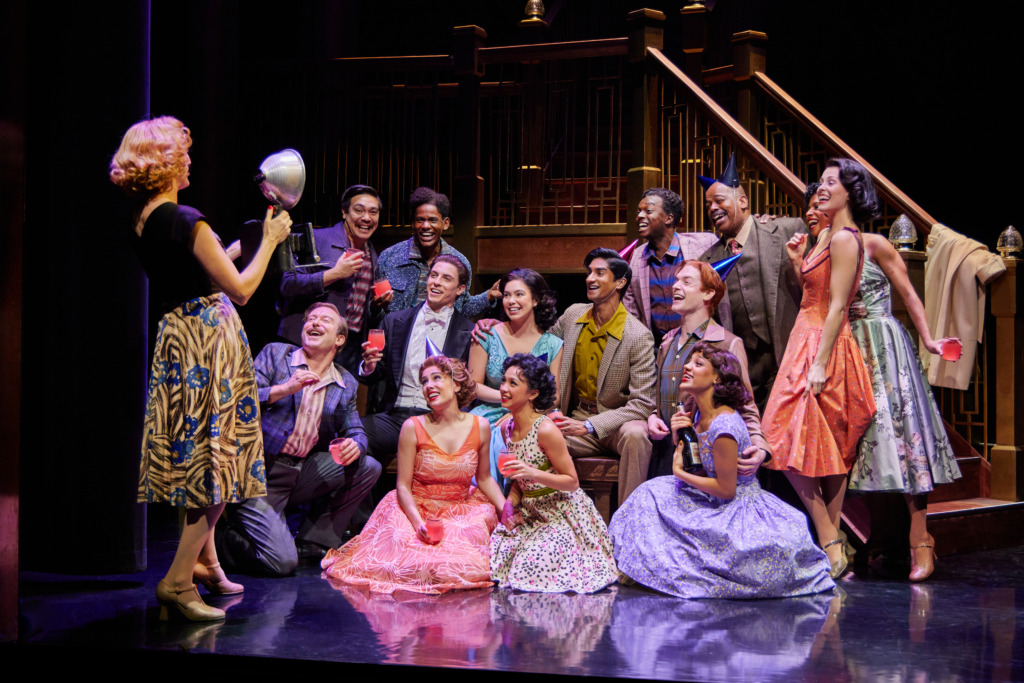
Choreographer Emily Maltby keeps the production moving; the ensemble (a riot of talented performers: David André, Lauren Blackman, Julio Catano-Yee, Colin Cunliffe, Haile Ferrier, Emily Harvey, Wonza Johnson, Aubrie Knapp, Ryland Marbutt, Kevin Pariseau, Lance Roberts, Tyley Ross, Paul Schoeffler, Maria Cristina Posada Slye, Kristin Yancy) are featured in a great many, highly-stylized dances suitable both for the era and the tempo of the music. The most impressive feature of Maltby’s choreography isn’t the energetic routines or even the feelings that they share with the music that underscores them, but the astonishing way that Maltby fits these routines into a compressed and truncated stage space without compromising or sacrificing the overall dance moves. Because of the way the orchestra pit and staircase are situated, it does not leave an infinite plethora of space for splashy choreography, however, Maltby’s approach never once leaves the dancing looking like it’s been compacted or compressed. You hardly even notice that the ensemble are dancing in a restricted space.
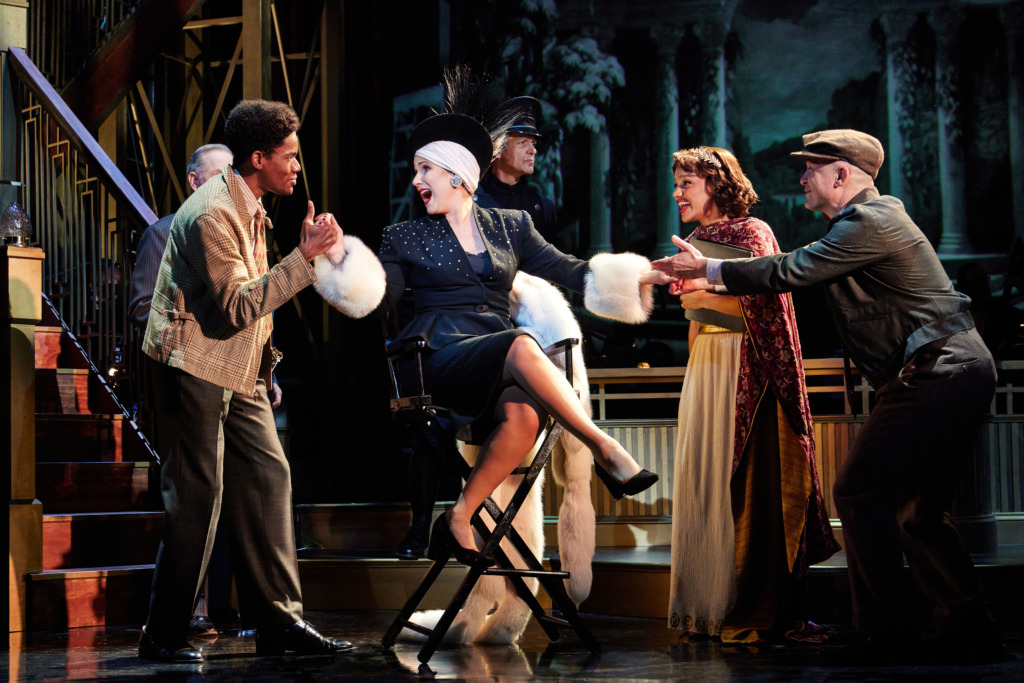
There are quirky supporting characters, the structural lean-tos of Norma Desmond and Joe Gillis’ storyline, peppered throughout the tale. Artie Green (Michael Maliakel) is one, Sheldrake (Kevin Pariseau) and the undeniably composed Cecil B. DeMille (Paul Schoeffler) are two others. Maliakel cuts quite the figure, a lanky tall fellow who carries his character with the cool, polished veneer of a working kid who is faking-it-til-he-makes it, only the character has just made it. Pariseau as Sheldrake delivers the expectation of uptight, dismissive Hollywood jerk that often accompanies that era of bygone golden days. Schoeffler, as Cecil B. DeMille (the line most quoted from both movie and film, “…I’m ready for my close-up, Mr. DeMille.”) brings a striking balance to the stage when he is identified at the studio. You expect this aloof, cold, hard-pressed celebrity but when he kicks back at the “give her the brush” line delivered by one of the ensemble women, you feel real heart behind his character. Schoeffler warms to Norma Desmond with pity masquerading as compassion and when he sings, however briefly, during “Was That Really Norma Desmond?/Surrender (Reprise)” you can feel his voice calling back the memory of yesteryore as readily as if it were but moments ago.
The character of Betty, though feeling slightly underdeveloped, purely from a libretto standpoint, presents a challenge to the overall plot structure, but this is an Andrew Lloyd Webber musical that has stood the test of time (unlike Starlight Express or some of those other more obscure pieces he’s put forth in his illustrious career) so who am I to argue with her lack of developmental existence? Regardless of the character’s questionably problematic existence and placement, Auli’i Cravalho delivers the perfect ingenue archetype with a glossy, hope-filled soprano sound to match the dreamy-eyed notions of Betty Schaefer. The meet-cute chemistry she develops with Joe is exactly as described, cute. And when they sing together for “Girl Meets Boy” you get the sense that if this were a different story they would immediately be drawn together forever. Cravalho finds a surprising emotional depth to the character when she arrives at Sunset Boulevard towards the show’s conclusion, forcing the play’s ending into rapid action with a single gesture and facial expression.
With a mellifluous voice in which one could easily drown, all the way down in the low-register of his baritone-bass range, Nathan Gunn as Max Von Mayerling, burbles you along down the narrative river with both his characterization and superior sound. It’s only once you get to the conclusion of the show— where he’s singing “New Ways To Dream (Reprise)” that you realize he’s been slowly drowning you in the river Styx. His accent is strong, not overbearing and perfectly articulated, but his voice is hypnotizing. When he sings you find yourself wondering where and when you are exactly; it’s a strangely enjoyable effect.
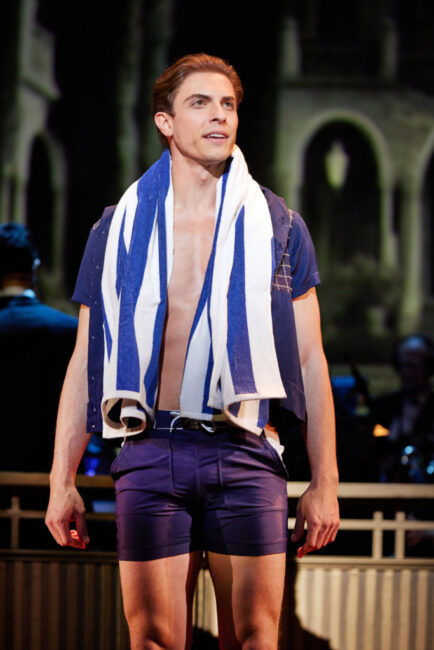
The indefatigable and frenetic energy that comes bursting out of Joe Gillis (Derek Klena) from jump-street is astonishing. You reel in the tempest of his mercurial performance, flying from eager to erratic, smooth to spastic, and several places in-between all throughout the production. Klena’s perfect pitch and command of tone defies description. He possesses the rare ability to truly tell the story while singing it. No one is going to argue that the music is complex and impressive and emotional and that there are lyrics there as well, but Klena takes it to another indescribable level. He’s singing this story to an auditorium of 1,000 people, but you feel what’s happening as if he’s expressing it personally to you; that’s a rare and beautiful talent to possess. Klena is a blazing conflagration for the titular number at the top of the second act, becoming a vocal tiger that paces with unyielding fury, one mere note from busting loose and consuming the stage with his emotions. And when he spirals off the rails, whilst maintaining impeccable vocal control, during the blast-out sequence with Betty, “What’s Going On, Joe?” it’s phenomenal. Klena makes this as much Joe Gillis’s story as it is Norma Desmond’s story and he is a well-matched equal for the sensational Stephanie J. Block.
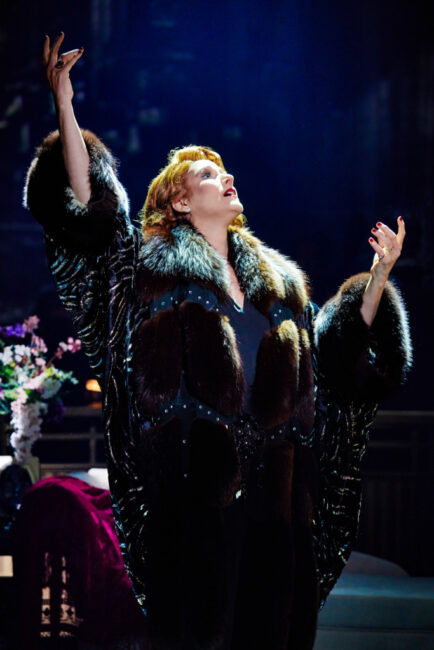
It has come to be the expected practice that when a name of Broadway and musical theatre makes their entrance to the house in a show, the audience loses their mind a little bit with applause and cheers. Stephanie J. Block is no exception for Sunset Boulevard, however, her performance truly warrants such reactions from the audience. She is delivering on every level— physically, emotionally, vocally, and beyond. The truly cinematic moment— quite a concept for a live-stage production (and made possible with Sammi Cannold’s brilliant direction and careful crafting of the moment itself alongside Cory Pattak’s lighting)— comes when Block returns to the studio and takes it all in. The scene slows, the lighting almost creates a black and white illusion for everyone but Block and for one moment you are Norma Desmond drinking it all in. Block doesn’t that illusion but rather gracefully opens the door to her version of reality as she spills into “As If We Never Said Goodbye.” Her voice is beyond transportive; Block’s singing talent become and expressiveness become the Virgil to this story’s inferno, guiding through the memories as if they were happening in live time. Her explosive madness is equal parts raw and pitiable and the show’s conclusion as she comes down those stairs one last time is breathtaking in the most harrowing and tragically beautiful way imaginable. When she belts, you feel it out on the promenade. But her vocal acrobatics, trapezing her way through operatic sounds and higher ranges all whilst juggling emotional gravity that likes of which cannot be compared, are what cement her performance as perfect. A stellar sensation, Stephanie J. Block lives Norma Desmond in all of her disastrous glory for all to experience.
It’s a limited engagement, one not to be missed. They will show you new ways to dream, of that there is no doubt. Sunset Boulevard is an emotional roller coaster, still thrilling, still terrifying, still utterly heartbreaking and a perfect selection for the middle of this season’s ‘Broadway Center Stage’ series.
Running Time: 2 hours and 30 minutes with one intermission
Sunset Boulevard plays through February 8, 2023 as a part of the Broadway Center Stage series in the Eisenhower Theatre at The John F. Kennedy Center for the Performing Arts, 2700 F Street NW, Washington, DC. For tickets call the box office at (202) 467-4600 or purchase them online.

